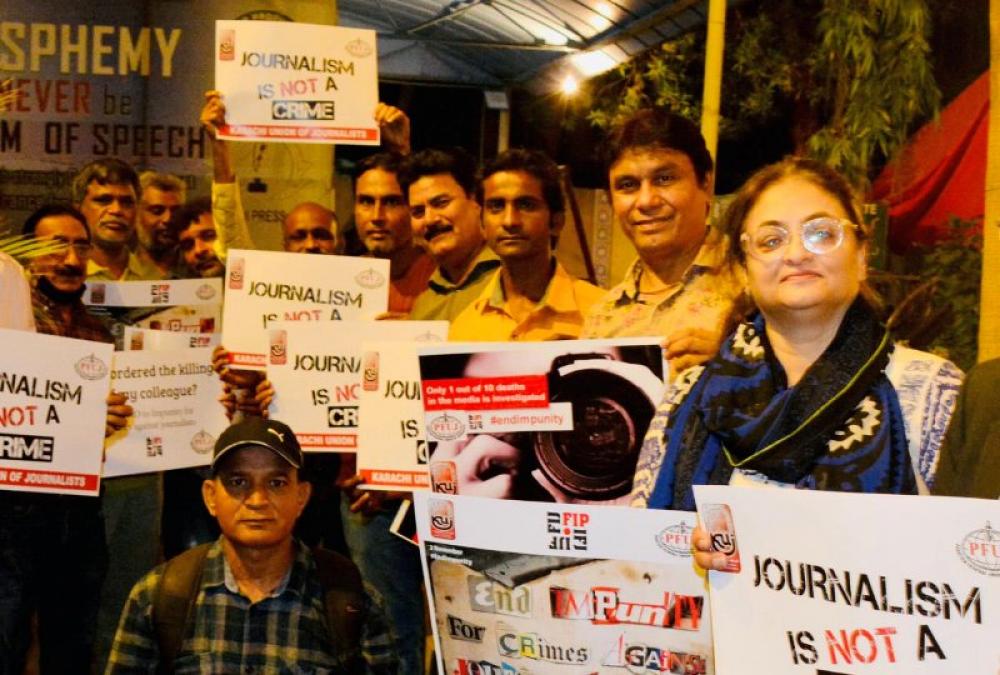Just Earth News | @justearthnews | 04 Nov 2021, 09:49 am Print
 Media in Pakistan
Media in Pakistan Pakistan Federal Union of Journalists (PFUJ) organized demonstrations on Nov 2 to protest the increased impunity on crime against Pak scribes. Photo by Aajiz Jamali (@aajizjamali7) via Twitter/PFUJ (@pfujpakistan)
Islamabad (JEN): At least 23 Pakistani journalists and information practitioners have been booked under the country's 'draconian' cyber-crime law in the last two years, according to a new report by a media rights watchdog.
Freedom Network, a Pakistan-based independent media and civil liberties organization, in its recently published report said a "chilling pattern" has emerged in the use of the criminal defamation section of the country's anti-cybercrimes law, the Prevention of Electronic Crimes Act (PECA), which has been used frequently to charge journalists and information practitioners in connection with their digital journalism and online expression.
Pakistan Silencing Online Journalists Through Legal ‘Victimization’
— Freedom Network (@pressfreedompk) November 1, 2021
Freedom Network releases Annual State of Impunity for Crimes against Journalists and Media 2021#EndImpunity #FreedomNetwork#JournalismIsNotACrime https://t.co/leZXg0guEk pic.twitter.com/WMqKRcm9mN
The new research by the media rights group has revealed that cases were registered against 56 percent of the two dozen Pak journalists and information practitioners who had a brush with the PECA between 2019 and 2021.
"Out of these individuals who were formally charged under PECA, around 70 percent were arrested, and just over half of the arrested were allegedly subjected to torture in custody," the report, which was published on the eve of the annual 'International Day to End Impunity for Crimes against Journalists' observed globally on Nov 2, read.
Categories of #journalists most frequently targeted through #PECALaw#JournalistDay#JournalismIsNotACrime #EndImpunity https://t.co/leZXg0guEk pic.twitter.com/KvqLYYFPww
— Freedom Network (@pressfreedompk) November 2, 2021
The media rights watchdog stated its report's findings are based on the analysis of cases of 23 scribes who were earlier served notices by the Federal Investigation Agency (FIA) under PECA or charged with offences under the same law during the period 2019-21.
The executive director of Freedom Network, Iqbal Khattak, said Pak journos are increasingly using online spaces to share independent news and critical commentary that are suppressed on the traditional media.
#Journalists targeted by medium under #PECALaw in #Pakistan #EndImpunity #JournalistDay #JournalismIsNotACrime https://t.co/leZXg0guEk pic.twitter.com/djxwP9nDbV
— Freedom Network (@pressfreedompk) November 2, 2021
“We have noticed a corresponding increase in efforts to control online expression, either legally or through coordinated digital campaigns against journalists,” Iqbal Khattak said.
"It is unacceptable for democratic societies to criminalize dissent and enforce victimization through arrests and torture of journalists, which must stop forthwith, and which contribute to Pakistan’s abysmally low ranking on global freedom of expression index," he added.
Riskiest cities for #jurnalists where #PECALaw is used to criminalize #dissent in #PakistanCricket #EndImpunity #JournalistDay#JournalismIsNotACrime https://t.co/leZXg0guEk pic.twitter.com/gp2YxExS4f
— Freedom Network (@pressfreedompk) November 2, 2021
According to the report by the Freedom Network, Pakistan's Punjab is the "most dangerous" region for journalists when it comes to being targeted under the PECA with 10 of the 23 cases reported there, followed by the Pak capital of Islamabad with eight cases.
- Viral Irish food bank photo sparks shocking racist attacks on Indians
- Caught on camera: Two foreigners assaulted in Israel in an alleged racial attack
- Pakistan: Parents heartbroken after court sides with man accused of kidnapping minor Christian girl
- Pakistan: Trafficked 35 years ago, Bangladesh-born woman approaches court against FIA for offloading her from flight!
- Hindu tea worker found bound and bloodied in Bangladesh garden during general elections; investigation underway





-1763561110.jpg)
